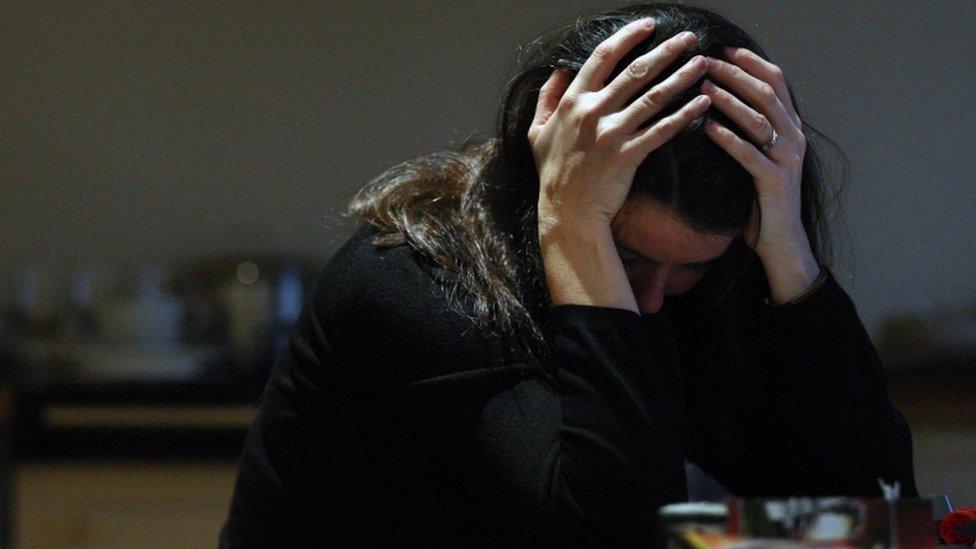New non-fatal strangulation law to target domestic abusers
- Published

Abusers who use non-fatal strangulation will face up to five years in jail under a new law planned by the government.
Campaigners have been calling for the change, arguing that perpetrators are often only charged with common assault, meaning up to six months in jail.
The government had initially said it had no plans to change the law.
But now, ministers plan to make non-fatal strangulation a specific criminal offence in the Domestic Abuse Bill., external
The Domestic Abuse Bill - which largely applies to only England and Wales - is currently being considered by the House of Lords.
Until now, politicians and campaigners have so far tried and failed to have a new offence of non-fatal strangulation introduced in the bill.
Campaigners say it is a terrifying crime and is used by domestic abusers to control their partners.
And because it may not leave any marks on the victim, prosecutors do not bring more serious charges, they say.
Now, the government plans to make it a specific offence to intentionally strangle another person or do any other act that affects their ability to breathe. It will also cover suffocation.
The legislation will be introduced as an amendment to the bill, the government said on Monday.

'It was his favourite thing to do'
WATCH: Domestic abuse victim - 'He threw me against the wall and strangled me'
For the five years they were together, Jenny's abusive partner used non-fatal strangulation as a means of control.
"It was like his favourite thing to do," said Jenny, who asked the BBC not to use her real name.
"That sounds really awful and trivial but that is how it becomes as an abuse victim. You learn to accept that is part of your life. It was like something I had to manage."
"We would wake up in the morning and he would be in one of those moods, and I would see it in his eyes and I would think today's the day I'm going to get it.
"It could be something as simple as: 'I don't like what you have got on' - that would end in strangulation."
Despite the pandemic, Jenny says that having finally escaped her abuser: "2020 was one of the best years of my life."

Legislation will also be strengthened around controlling or coercive behaviour to no longer make it a requirement for abusers and victims to live together.
Laws to target so-called "revenge porn" will also be expanded to include threats to disclose intimate images with the intention to cause distress.
The domestic abuse commissioner for England and Wales, Nicole Jacobs, called the changes a "huge win".
"I am delighted that the government has listened and acted," she said.
"Nevertheless, the government must still go further to make this bill genuinely 'landmark', by increasing the provision of services in the community and ensuring protections are extended to all victims and survivors, regardless of their immigration status."
The government previously said it had no plans to change the law, arguing that non-fatal strangulation is already covered by existing legislation such as common assault and attempted murder.
But peers in the House of Lords - led by Conservative Baroness Newlove - argued it should be included as an amendment in the current Domestic Abuse Bill.
The government then changed tack, with Justice Secretary Robert Buckland saying he hoped to make it a specific offence and too many violent offenders were not getting tough enough sentences.
If you are affected by domestic abuse, there is a range of support services available via the BBC's Action Line page.


Related topics
- Published5 January 2021

- Published11 January 2021

- Published28 October 2019

- Published16 February 2021
